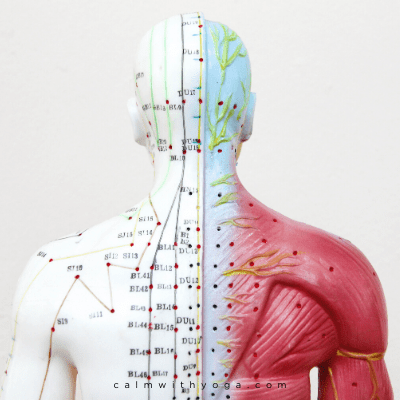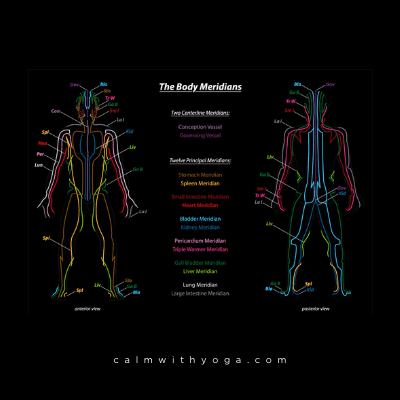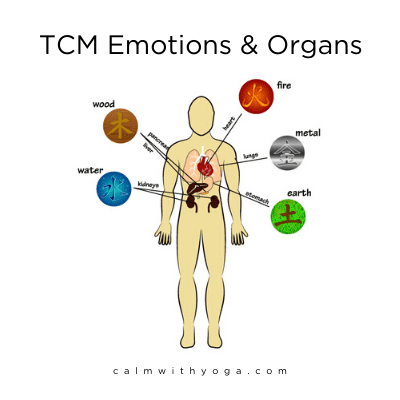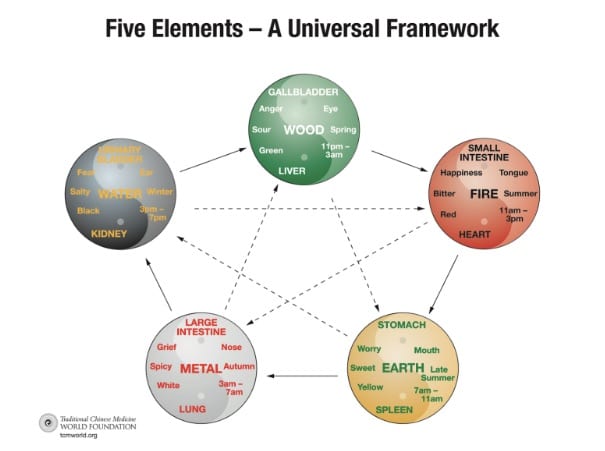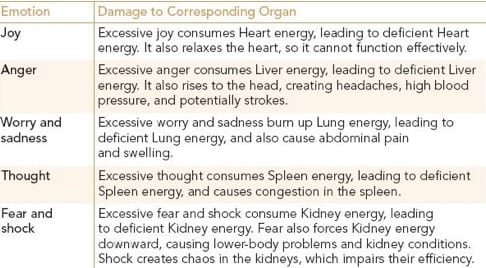According to the ancient art of Chinese medicine, our emotional state and chronic patterns can cause disease and make physical symptoms worse. Traditional Chinese Medicine (TCM) is one of the oldest healing traditions on the planet. Its origins date back thousands of years to ancient China, though it has certainly evolved to accommodate modern times. TCM practitioners and acupuncturists use:
- herbal medicine
- acupuncture
- mind-body practices like Qigong and Tai Chi to keep Chi/Qi (life force energy) circulation flowing throughout body and systems and as a means of preventative health care.
A central concept to TCM is the concept of the flow of Qi. Qi can be seen as the invisible ‘life force’ or ‘vital energy’ that breathes life into all living organisms. This life force carries with it intelligence and information.
In the human body, Qi flows through meridians. Meridians are an energy distribution system; they’re energy pathways or channels mapped throughout the body. Meridians help the flow of energy travel through the body to deliver energy to the body’s various organ systems such as the immune system and nervous system. They flow within the body, not on the surface, and exist in corresponding pairs. Each meridian carries multiple acupuncture points along its path. (1) According to the Traditional Chinese Medicine World Foundation, there are Four Key TCM Principles: (2)
- Your body is an integrated whole.
- You are completely connected to nature.
- You were born with a natural self-healing ability.
- Prevention is the best cure. And according to the National Center for Complementary & Integrative Health, the ancient beliefs on which TCM is based are: (3)
The Role of Emotions in the Body
Before we get into the emotional paradigm of TCM here’s a foundational theory that relates to this topic.
The Five Elements Theory:
According to the Traditional Chinese Medicine World Foundation: As you can see, TCM views all things as being interconnected via intelligent, coherent patterns. The Five Elements are a comprehensive template that organizes all natural phenomena into five master groups or patterns in nature. Each of the five groups—Wood, Fire, Earth, Metal, and Water—include categories such as a season, a direction, climate, stage of growth and development, internal organ, body tissue, emotion, aspect of the soul, taste, color, sound… It provides a master blueprint that diagrams how nature interacts with the body and how the different dimensions of our being impact each other… The Five Elements include the internal organs and the interconnected relationships between them.” (4) In this paradigm, emotions affect our physiology because specific emotions are related to corresponding organs. Chinese Medicine Philosophy considers a foundational basis of seven emotions, and each emotion influences a specific set of primary and secondary organs. Based on the 5 Element Theory: Primary organ + Secondary organ pairings:
(1) Liver + (2) Gallbladder (1) Heart + (2) Small Intestine (1) Stomach + (2) Spleen (1) Lung + (2) Large Intestine (Colon) (1) Kidney + (2) Urinary Bladder
There are slight variations and somewhat differing views on the exact emotions and their exact organ relation, so I will outline three perspectives here: According to Cyndi Dale’s The Subtle Body: An Encyclopedia of Your Energetic Anatomy: According to Shen-Nong.com, a leading website providing TCM information, applications, and references: Excessive anger, for example, is dangerous to the liver and other parts of the body. The liver is where anger dwells. Extreme irritation or rage will amplify the liver energy, which will then rush to the head, potentially causing high blood pressure or headaches, or in the worst-case scenario, stroke. While emotions affect the organs, it is important to remember that they are also created in specific organs. An organ “gives rise” to an emotion.” (5) Shen-Nong Emotional Overview: (6) Emotional activity is seen as a normal, internal, physiological response to stimuli from the external environment. Within normal limits, emotions cause no disease or weakness in the body. However, when emotions become so powerful that they become uncontrollable and overwhelm or possess a person, then they can cause serious injury to the internal organs and open the door to disease. It is not the intensity as much as the prolonged duration of an extreme emotion, which causes damage.” (6)
- Joy –
- Anger – Over-stimulation can lead to problems of heart fire connected with such symptoms as feelings of agitation, insomnia and heart palpitations.”
- Anxiety – Anger will thus affect the liver, resulting in stagnation of liver qi (vital energy). This can lead to liver energy rising to the head, resulting in headaches, dizziness, and other symptoms. In the long run it can result in high blood pressure and can cause problems with the stomach and the spleen.”
- Grief – Anxiety injures the lungs, which control qi (vital energy) through breathing. Common symptoms of extreme anxiety are shortness of breath, retention of breath, shallow, and irregular breathing… Anxiety also injures the lungs’ coupled organ, the large intestine. For example, over-anxious people are prone to ulcerative colitis.”
- Pensiveness – However, grief that remains unresolved and becomes chronic can create disharmony in the lungs, weakening the lung qi (vital energy).”
- Fear – This can lead to a deficiency of spleen qi (vital energy), in turn causing worry and resulting in fatigue, lethargy, and inability to concentrate.”
- Fright – But when it becomes chronic and when the perceived cause of the fear cannot be directly addressed, then this is likely to lead to disharmony. The organs most at risk are the kidneys. In cases of extreme fright, the kidney’s ability to hold qi (vital energy) may be impaired leading to involuntary frequent urination.” According to the Traditional Chinese Medicine World Foundation: Fright primarily affects the heart, especially in the initial stages, but if it persists for some time, it becomes conscious fear and moves to the kidneys.” Heart health: Everything that makes up a human being, mind-body-spirit, correlates at an energetic level to something “external” in nature. We can use the vibrational frequency of nature and these principles of natural law to heal and balance our bodies and emotions.” (7) Liver health: This means that all the other organs will sacrifice for the Heart. In other words, they will always give their energy to help the Heart maintain its balance. The heart’s partner is the small intestine. The Stomach is the “child” of the Heart. If the Stomach is functioning well then the mother, the Heart is happy or less impacted. The Five Element chart also shows us that the Liver is the “mother” of the Heart. When a person is under continual stress, Liver energy becomes compromised because one of its energetic functions is to smooth and regulate emotions. So when chronic stress or excessive emotion is experienced, the Liver cannot offer proper support to the Heart. Because of these important relationships as described by Five Element Theory, if you want to really take care of your cardiovascular health, it’s crucial to take care of your digestive organs, the Liver and the Stomach!” (8) Lung health: The Liver’s partner organ is the Gallbladder. Anger is the emotion associated with the Liver. If you are often irritable, get angry easily, have trouble unwinding from the day’s activities, have trouble reasoning or going with the flow and letting things go, you are experiencing a Liver function problem. Experiencing these emotions chronically or excessively can seriously unbalance the function of your Liver.” (9) Stomach health: Emotionally and physically, the Lung (along with its organ partner, the Large Intestine), is responsible for helping you “let go” of whatever you don’t need, from life experiences to emotions to actual metabolic by-products… Sadness and grief are the emotions associated with the Lung and Large Intestine. If you cry easily or have trouble processing grief and loss, you may have an imbalance in your Lung energy.” (10) Kidney health: Remember, the Stomach is responsible not only for digesting food and drink but also for digesting your emotions and thoughts, keeping what nurtures your spirit and letting go of what doesn’t! Worry, anxiety, and overthinking are the emotions associated with the Stomach. If you constantly worry or over-think things (especially negative thoughts!), get anxious easily, you may have a Stomach imbalance or function disorder! Experiencing any emotion chronically or excessively can damage Stomach and digestive health, as the digestive system processes not just the food you eat, but the thoughts and emotions that you internalize.” (11) This TCM Emotional Framework helps us understand our emotions better so we can take more efficient action in shifting what needs to be shifted. Fear is the emotion associated with the Kidney. If you often have severe panic attacks, anxiety, and fear, your body may be trying to tell you that Kidney energy is running low or is imbalanced.” (12) As an extra resource to help you understand the power of TCM and healing, you can check out this interview with TCM practitioner Dr. Akemi Korahais as she shares her story of healing from cancer via TCM and other modalities. REFERENCES :
